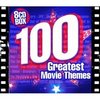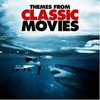Soundtrack Information

A Tribute to James Dean
Legacy Recordings (CK 86798)
Year Released: 1956 / 2003
Conducted by Ray Heindorf
Performed by
The Warner Brothers Studio Orchestra
Format: CD
Music By
Purchase Soundtrack
Track Listing
Related Albums

GiantLimited Edition of 3,000 Units
La-La Land Records (LLLCD 1333)Released: December 1, 2015
Format: CD (149 min)
Review: Tribute to James Dean, A
3 / 5 Stars
While most stars have a period of a few years of fame, James Dean is one of a few icons who have persisted and flourished in American cinema over the course of decades. His film acting career covered a brief span in the mid-fifties, with such memorable films as East of Eden (1955), Rebel Without A Cause (1955), and Giant (1956), with his tragic death in 1955 cutting it short. Lush scores by Leonard Rosenman and Dimitri Tiomkin help evoke the time and place of these films and recall the brief greatness of this troubled young star.
Brooklyn-born Rosenman was friends with Dean, who introduced him to director Elia Kazan, who decided to take a chance and let the Stravinsky/Barok-influenced Rosenman have a go at East of Eden, a film based on a section of a John Steinbeck novel which takes place in the Monterey peninsula before and during World War II. Rosenman insisted on being allowed to compose and play the music on the set, which helped both he and the actors focus their work. The result is a stirring and surprisingly eerie theme that quickly pushes us through the quiet beauty of Monterey and into the dark troubles of the characters in the story.
Rebel Without A Cause was also scored by Rosenman, and it is not completely dissimilar in terms of feel of the score. The big difference is that Rosenman, like many of his contemporaries, started to add jazz and other exotic sounds into the score. This is appropriate, given the strong, non-conformist theme of the piece. As with the other film, Rosenman quickly takes us from the sense that "everything is okay" to the sense that "there is trouble in paradise". What is good here as well is that even with this element, Rosenman has a strong emotional throughline in his music, so all the attempts to set up conflict and chaos do not spoil our connection with the characters.
Giant, composed by Dimitri Tiomkin, is the most traditional score of the group, stressing more basic values and de-emphasizing the struggle against authority. This score combines almost clichéd Western themes with broad melodramatic elements that give an overall sense of grandeur appropriate to the film. Consciously or not, the composer set up a contrast between the sweeping nature of the score and the intimate intensity of the characters. Also, the Western-like elements immediately set the story in a specific locale - we feel like we are in Texas before we see a single frame of the location.
The criticism that could be leveled at these scores reflects more our time than problems with the scores themselves: these scores are much broader and less scene-specific than scores are now. So audiences now, who expect their emotions to be micro-managed with the score, might be unsatisfied with the broadstroke approach of the time. Of the three scores, the first two, East of Eden and Rebel Without A Cause, are much more accessible and intriguing. Heard alone, they make the listener curious about the story they are parts of. Giant's score is so broad that it is almost distracting. It does not feel organic to the piece.
In conclusion, this CD is for the film fan who longs for the film sounds of the fifties or sixties, when soundtracks had started to introduce non-traditional elements to traditional scores, but had not made a full transition either. Dean fans will love this soundtrack, as, despite their broadness, they still do evoke his films. For those with a taste for more modern (i.e. 1970's and beyond) soundtracks, this CD is not for you.
-
Click stars
to rate.
If any information appears to be missing from this page, contact us and let us know!





